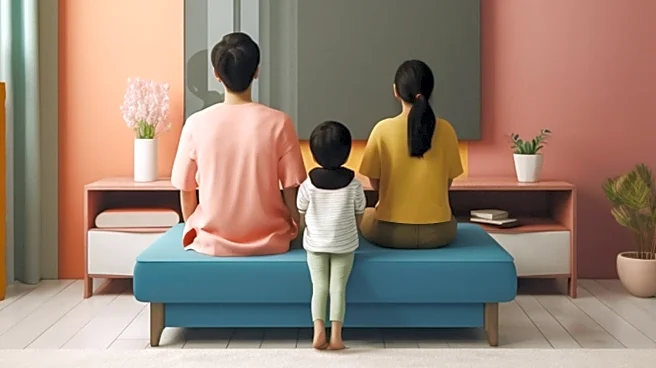What's Happening?
The Princess of Wales, Catherine, has raised concerns about the negative impact of excessive screen time on family relationships. In an essay titled 'The Power of Human Connection in a Distracted World,' co-authored with Prof Robert Waldinger from Harvard Medical School, she highlights how smartphones and digital devices are creating an 'epidemic of disconnection.' Catherine argues that while these devices promise connectivity, they often lead to isolation and distraction, undermining the quality time families spend together. She emphasizes the importance of fostering healthy relationships within families, which are crucial for physical and mental health. The essay is part of her early years education campaign, aiming to raise awareness about the significance of children's first years. During a visit to the Home-Start centre in Oxford, Catherine discussed these issues and interacted with children, underscoring the need for developing social and emotional skills in a technology-driven world.
Why It's Important?
The Princess of Wales's warning about excessive screen time is significant as it addresses a growing concern in modern society. The prevalence of digital devices has transformed communication, but it also poses challenges to interpersonal relationships, particularly within families. Catherine's advocacy highlights the potential long-term effects on children's social and emotional development, which are critical for their future well-being. By drawing attention to this issue, she encourages families to prioritize meaningful interactions over digital distractions. This message resonates with broader societal concerns about mental health and the importance of nurturing human connections in an increasingly digital world. Her involvement in early childhood education initiatives further emphasizes the need for awareness and research on the impact of technology on family dynamics.
What's Next?
The Royal Foundation Centre for Early Childhood, launched in 2021, continues to focus on raising awareness and gathering research evidence about the importance of children's early years. Catherine's essay and public engagements are likely to stimulate discussions among educators, parents, and policymakers about balancing technology use with fostering healthy family relationships. As digital devices become more integrated into daily life, there may be increased efforts to develop guidelines and programs that support families in managing screen time effectively. The Princess's advocacy could inspire initiatives aimed at promoting social and emotional skills in children, ensuring they are equipped to navigate a world immersed in technology while maintaining strong interpersonal connections.
Beyond the Headlines
Catherine's message also touches on ethical and cultural dimensions, as it challenges societal norms around technology use. Her call for reduced screen time and increased family interaction may prompt a reevaluation of how technology is integrated into daily life, particularly in educational settings. The emphasis on human connection aligns with broader cultural shifts towards mindfulness and mental health awareness. Additionally, her involvement in this issue highlights the role of public figures in influencing social change and advocating for policies that prioritize well-being over technological advancement.








